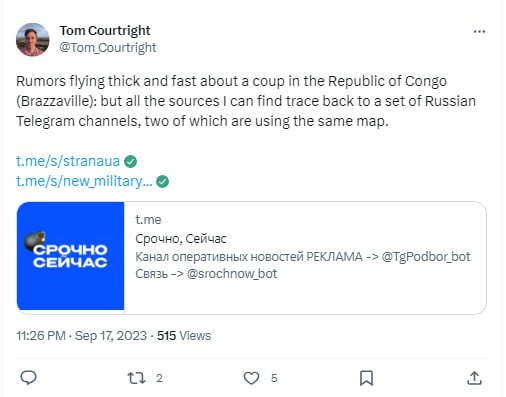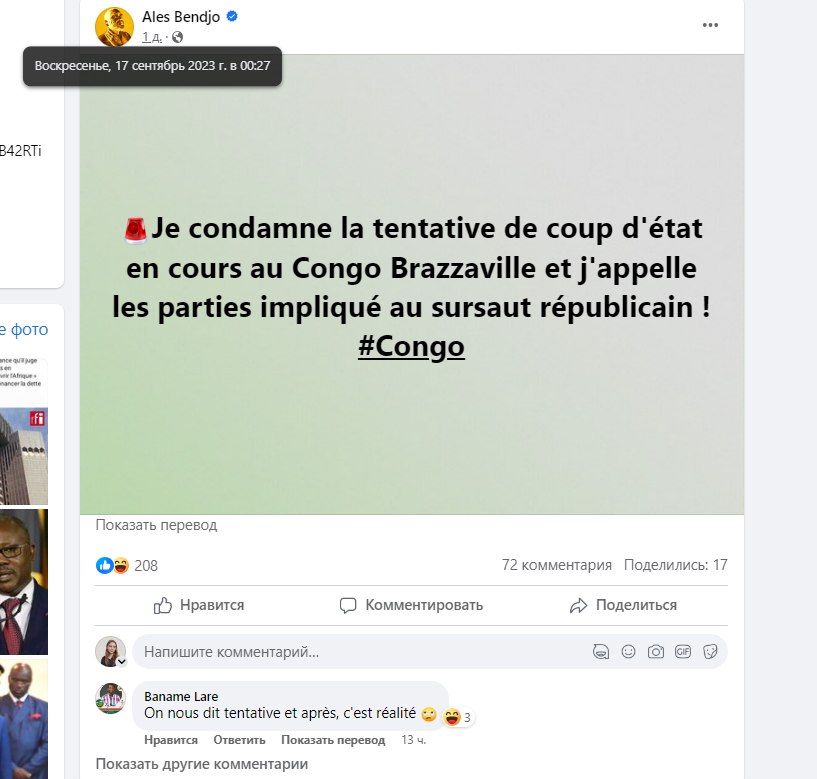On September 17, a series of reports on the alleged military coup in the Republic of Congo emerged in social media and media outlets. A couple of hours later, the government of the Republic made an official refutation.
We attempted to figure out what was going on and what had unleashed the wave.

Around 7 p.m., a number of Russian-language Telegram channels reported an alleged coup attempt in the Republic of Congo. The same news was published by the Krasnaya Vesna news agency with a reference to the previously unknown to us Yoruba Times. The same source was then referred to by other media outlets. Global news agencies, as well as credible local media, did not report anything unusual.
At 8:22 p.m. Moscow time, Thierry Mungalla, Minister of Communications and Media of the Republic of Congo, refuted reports of a coup in a post on ex-Twitter. The rebuttal was duplicated on the government’s official website. Kinshasa must have tensed up too, but remained silent.
Shortly after the official retraction, Tom Courtright, a British living in Kenya, on his ex-Twitter accused pro-Russian telegram channels of sparking coup rumours in the Republic of Congo.

The news on the Krasnaya Vesna website (7:43 p.m.) came before the Yoruba Times news (8:03 p.m.), although the Russian media refers to it. Hence, the Nigerian resource cannot be considered the original source of the reports.
We found the earliest mention of the coup in the Republic of Congo on the Facebook of Ales Bendjo, a singer/actor of Cameroonian origin living in Italy (17 thousand followers). His post (already deleted) with a sudden condemnation of the coup was published on September 17 at 00:27 a.m. Moscow time, and almost immediately sent to the group FirstNiger with 34.8 thousand followers. The next post, published on September 17 at 11:39 a.m, already reported that everything was calm in Congo. We tried to contact the author of the publications, but he did not respond.


The fake news dispersed after 3 p.m. on September 17: RT Afrique Pro Facebook channel published a report about the coup at 3:39 p.m. It is a fake mimicking RT (confirmed to us by RT). We also found some Brazilian media news and publications on the personal pages of Africans mentioning the “coup leader”, the head of the Presidential Guard, General Serge Oboa, and the same photo. Some publications (e.g. LesNews) noted the Republic’s ties with Russia.

In most cases, “local media” were mentioned as the source, with no specification. One of the publications contained a screenshot of a WhatsApp chat, which allows to assume that the news was disseminated by Africans through the messenger. Participants of the dispatches did not respond to our enquiries on the source of the information.
Histoires d’Afrique, Twitter account with 139.6 thousand followers, published reports of the coup at 5:58 p.m., noting that the information was unconfirmed.

Then came a wave of publications in Russian-language channels and later in the media, which was barely stopped. According to Andrey Maslov, the director of the HSE Center for African Studies, it looks very much like a planned action aimed at sowing discord between Russia and its long-time good friend Denis Sassou Nguesso, the president of the Republic of Congo, and then blaming the Russians for spreading the fake coup information.
Author:
Olesya Kalashnik
